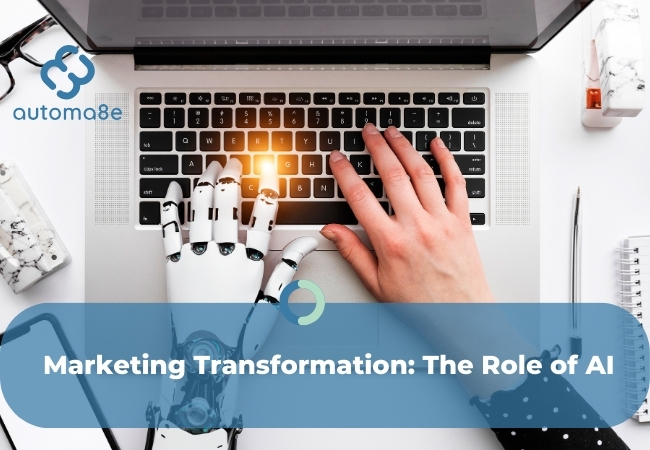In the fast-paced realm of modern business, marketing transformation the role of AI stands as a beacon of innovation and opportunity. As industries adapt to the digital landscape, the convergence of marketing and artificial intelligence (AI) has become increasingly prevalent. From predictive analytics to personalised customer experiences, AI is revolutionising traditional marketing practices and reshaping the way businesses engage with their audience.
In this blog, we’ll explore:
- The Power of AI in Marketing Transformation
- Considerations for Implementing AI in Marketing
- The AI Toolkit for Marketers
- Conclusion
The Role of AI in Marketing Transformation
1. Enhancing Customer Engagement
AI technologies have become indispensable tools for creating personalized and engaging customer experiences. Through predictive analytics and machine learning algorithms, marketers can delve into customer behaviors, predict needs, and tailor interactions and content to foster meaningful engagement.
Example: Amazon
Amazon’s recommendation engine is a stellar example of AI-driven customer engagement. By analyzing user behaviors and purchase history, Amazon predicts consumer preferences and suggests products, significantly contributing to customer satisfaction and increased sales.
2. Automation for Efficiency
One of AI’s greatest strengths lies in its ability to automate mundane and time-consuming tasks, allowing marketing teams to shift their focus towards strategy and creativity. From data analysis to social media management, automation streamlines processes, improves accuracy, and enhances overall efficiency.
Example: HubSpot
HubSpot employs AI-driven automation in its marketing platform. This includes automating email campaigns, lead nurturing, and social media posting schedules, enabling marketers to optimize their time and resources for more impactful activities.
3. Personalization as a Cornerstone
AI-driven personalization emerges as a cornerstone in the realm of marketing transformation. By analyzing individual preferences and behaviors, businesses can craft targeted messages, increasing the relevance of campaigns and strengthening connections with their audience.
Example: Spotify
Spotify leverages AI to personalize user experiences through curated playlists and recommendations. By analyzing listening habits, favorite genres, and artists, Spotify delivers a personalized music experience to each user, enhancing engagement and user satisfaction.
The AI Toolkit for Marketers
1. Predictive Analytics for Insightful Campaigns
Predictive analytics forecasts customer behavior, enabling marketers to make data-driven decisions for more insightful and successful campaigns.
Example: Starbucks
Starbucks utilizes predictive analytics to forecast customer preferences and optimize product offerings. By analyzing historical data and market trends, Starbucks ensures that its menu aligns with customer expectations, leading to increased sales and customer satisfaction.
2. Natural Language Processing (NLP) for Effective Communication
NLP enhances communication strategies by analyzing and understanding human language, allowing businesses to create more effective and targeted messaging.
Example: ChatGPT
OpenAI’s ChatGPT uses NLP to understand and generate human-like text. Businesses can leverage similar technologies for chatbots and virtual assistants, improving communication with customers and enhancing user experiences.
3. Machine Learning for Optimal Campaign Targeting
Machine learning optimizes campaign targeting by analyzing vast datasets, ensuring that marketing efforts reach the most relevant audience segments.
Example: Facebook Advertising
Facebook employs machine learning algorithms to analyze user behavior and preferences. This allows businesses to create highly targeted ads, reaching audiences with specific interests, demographics, and behaviors, resulting in more effective advertising campaigns.
Considerations for Implementing AI in Marketing
1. Ethical Use and Transparency
As AI becomes integral to marketing, businesses must prioritize ethical use and transparency in decision-making processes to build trust with consumers.
Example: Tesla
Tesla’s use of AI in autonomous vehicles is a case in point. By transparently communicating about its AI algorithms and safety features, Tesla builds trust with its customers, fostering positive perceptions of AI technology.
2. Data Privacy Concerns
Addressing data privacy concerns is paramount. Businesses should implement robust measures to safeguard customer information and comply with regulations.
Example: GDPR Compliance
European companies, like those under the General Data Protection Regulation (GDPR), exemplify the importance of prioritizing data privacy. Complying with GDPR ensures that businesses handle customer data ethically, fostering trust and maintaining legal compliance.
3. Continuous Training and Adaptation
Providing ongoing training for marketing teams and staying informed about the latest AI developments ensures successful implementation and adaptation to evolving technologies.
Example: IBM
IBM offers continuous training programs for its employees to stay updated on emerging technologies, including AI. This commitment to continuous learning ensures that teams are equipped to leverage AI effectively in marketing strategies.
Conclusion
In conclusion, the integration of AI in marketing represents a revolutionary step towards transformation. By embracing predictive analytics, NLP, and machine learning, businesses can enhance customer engagement, automate processes, and personalize interactions. However, a careful consideration of ethical use, data privacy, and continuous training is essential to fully unlock the potential of AI in marketing transformation. The future of marketing is here, and AI is its driving force, shaping a landscape where businesses connect with their audiences in more meaningful and impactful ways.
